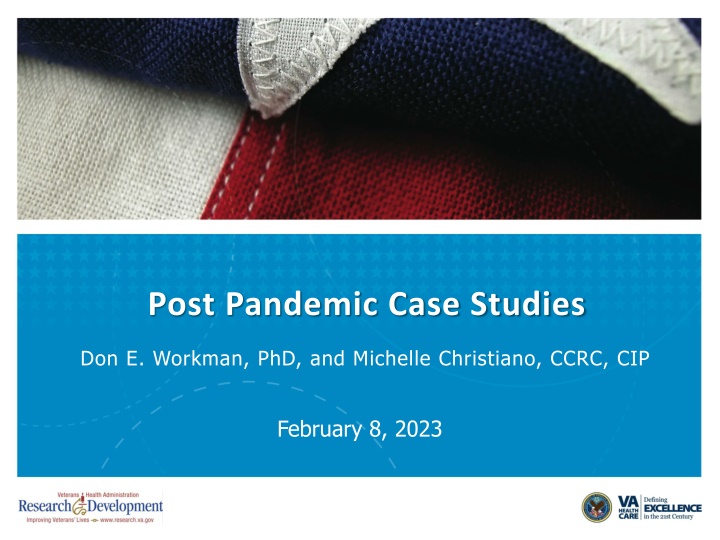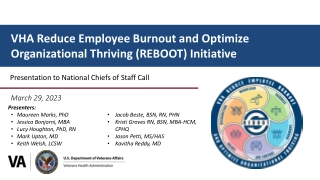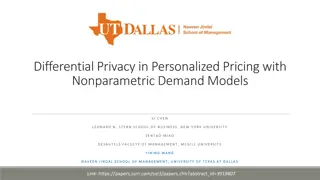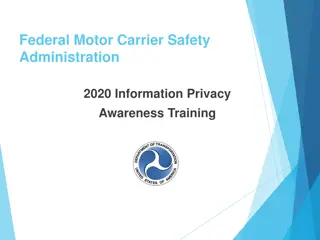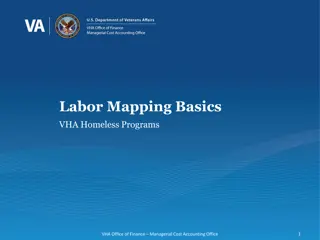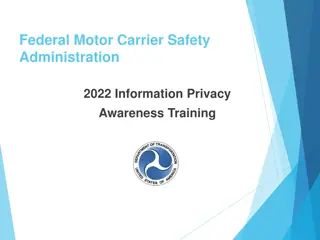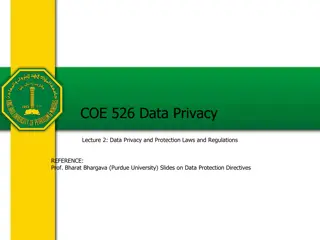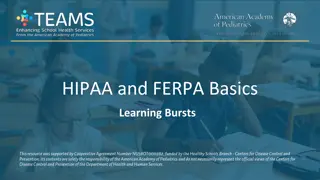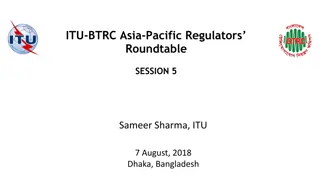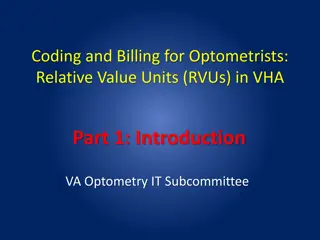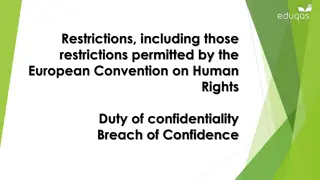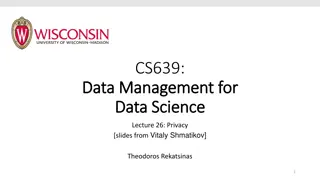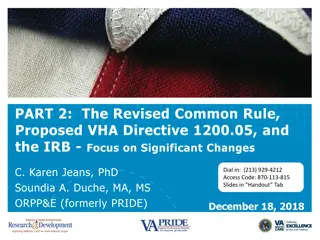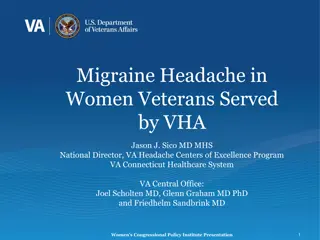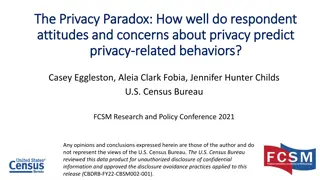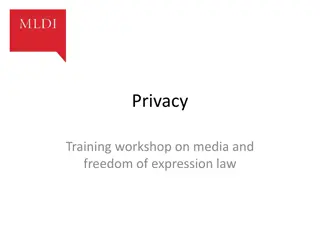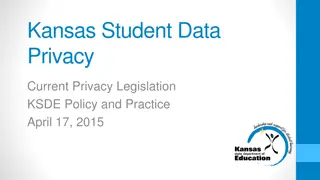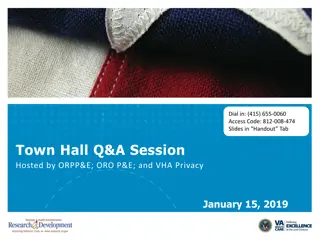Federal Privacy Laws and Regulations for VHA Data
This post discusses the disclosure authorities and relationship among federal privacy laws and regulations for VHA data, highlighting the statutes that govern VHA records, the requirements for valid HIPAA authorization in research, and the future use of sensitive personal information. It emphasizes the importance of understanding and complying with the various federal privacy laws when handling personal health information.
Download Presentation

Please find below an Image/Link to download the presentation.
The content on the website is provided AS IS for your information and personal use only. It may not be sold, licensed, or shared on other websites without obtaining consent from the author.If you encounter any issues during the download, it is possible that the publisher has removed the file from their server.
You are allowed to download the files provided on this website for personal or commercial use, subject to the condition that they are used lawfully. All files are the property of their respective owners.
The content on the website is provided AS IS for your information and personal use only. It may not be sold, licensed, or shared on other websites without obtaining consent from the author.
E N D
Presentation Transcript
Post Pandemic Case Studies Don E. Workman, PhD, and Michelle Christiano, CCRC, CIP February 8, 2023
Privacy Topics Disclosure Authorities Future Use Privacy Research Incidents Invalid or Missing HIPAA Authorizations Genetic Tests and Health Information Deceased Subjects and HIPAA Authorizations 2 2
Disclosure Authorities VHA applies five statues simultaneously (and their implementing regulations) to all disclosures of PII/PHI: Freedom of Information Act (FOIA), Title 5 United States Code (U.S.C.) 552, implemented by Title 38 Code of Federal Regulations (CFR), Sections 1.550-1.562 The Privacy Act, 5 U.S.C. 552a, implemented by VA at 38 CFR 1.575- 1.582 The VA Claims Confidentiality Statute, 38 U.S.C. 5701, implemented by 38 CFR Section 1.500-1.527 Confidentiality of Drug Abuse, Alcoholism and Alcohol Abuse, Human Immunodeficiency Virus (HIV) Infection, and Sickle Cell Anemia Health Records, 38 USC 7332 HIPAA (Public Law 104-191), implemented by 45 CFR Parts 160 and 164 3 3
Disclosure Authorities These five statutes govern the VHA records: Collection; Maintenance; Use and access; and Release or disclosure. The most stringent statute applies. If you cannot release under one of the statutes, then you are stopped from making the disclosure. 4 4
Relationship Among Federal Privacy Laws and Regulations for VHA Data 5 5
Disclosure Authorities for Research Valid HIPAA Authorization from the research subject meets requirements for all privacy statutes. An approved HIPAA Waiver of Written Authorization provides HIPAA Privacy Rule authority but does not give Privacy Act, 38 U.S.C. 5701 or 7332 authority to disclose outside VA. Privacy Act and 38 U.S.C. 5701 requires a contract or agreement to be in place that allows sharing for research activities Requests for contracts or agreements initiate at the facility research office Type of applicable contract or agreement is determined by Office of General Counsel (OGC) Special Team Advising Research (STAR) 38 U.S.C. 7332 requires written assurances to not identify any subjects in in any report of such research or disclose subject identities in any manner. 6 6
Future Use of Data Collecting Sensitive Personal Information (SPI) for future use, with respect to an individual, means any information about the individual maintained by an agency, including the following: (1) education, financial transactions, medical history, and criminal or employment history; and (2) information that can be used to distinguish or trace the individual s identity, including name, social security number, date and place of birth, mother s maiden name, or biometric records. SPI is a subset of VA Sensitive Information/Data. See 38 U.S.C. 5727. SPI is synonymous and interchangeable with Personally Identifiable Information which is any information that can be used to distinguish or trace an individual's identity, such as their name, social security number, biometric records, etc. alone, or when combined with other personal or identifying information which is linked or linkable to a specific individual, such as date and place of birth, mother s maiden name, etc. Information does not have to be retrieved by any specific individual or unique identifier (i.e., covered by the Privacy Act) to be personally identifiable information. NOTE: The term Personally Identifiable Information is synonymous and interchangeable with Sensitive Personal Information for future use including banking and subsequent uses by other research projects requires HIPAA authorization from the subject or their personal representative. 7 7
Future Use of Specimens Collecting specimens Optional Mandatory Identifiable or De-identified Coded can be both What data is attached to the specimen? Other concerns from a Common Rule perspective Not a privacy issue but was the subject consented to allow the use of the specimen and/or data? 8 8
Future Use A registry which includes the optional collection and banking/storage of PII to contact potential subjects for future use cannot be created with only a waiver of written HIPAA authorization. A HIPAA-compliant authorization is required to allow for the optional banking of the subject s PII. 9 9
Future Use The expiration date for optional banking for future use on the VA Form 10-0493, page five, should be selected as: Data use and collection will expire at the end of this research study. Any study information that has been placed into a repository to be used for future research will not expire. 10 10
Future Use An individual s contact information (name, phone number, email address, etc.) placed within a VHA repository for future use is still PHI. The use of this contact information must be covered under the new study s HIPAA waiver prior to use for recruitment purposes. 11 11
Privacy Research Incidents All privacy incidents, including: Invalid HIPAA Authorizations Missing HIPAA Authorizations Lack of Authority to Disclose Must be reported timely to the facility Privacy Officer and entered into Privacy and Security Events Tracking System (PSETS). 12 12
Invalid HIPAA Authorizations HIPAA Authorizations must meet the content requirements of VHA Directive 1605.01, Paragraph 14.b. to be valid. Failure to obtain signature and date signed by subject or personal representative. Authorization is invalid if missing either. 13 13
Invalid HIPAA Authorizations Failure to obtain signature and date signed by subject or personal representative on Page five (Consent for Future Unspecified Use of Specimen) This does not negate the entire HIPAA Authorization if they signed on Page four The team can simply obtain a new page five 14 14
Missing HIPAA Authorization Failure to obtain a HIPAA Authorization at all from a subject results in the inability of the VA Investigator to use the data collected from that subject UNTIL: The subject signs a HIPAA Authorization; OR The IRB or Privacy Board approves a Waiver of HIPAA authorization due to the inability to obtain signature on a HIPAA Authorization. 15 15
Lack of Authority to Disclose VHA disclosed PII/PHI pursuant to an invalid authorization or without legal authority, e.g., pursuant to a waiver of HIPAA Authorization only. Disclosure may have been to a study sponsor, affiliate or other non-VA entity. If authority for the disclosure cannot be rectified, the VA will ask for the recipient to return or destroy the data. 16 16
Genetic Tests and Health Information The HIPAA Privacy Rule definition of health information includes genetic information. Genetic information, with respect to an individual, means information about: (1) the individual s genetic tests, (2) the genetic tests of the individual s family members, (3) the manifestation of a disease or disorder in the individual s family members, or (4) any request for, or receipt of, genetic services, or participation in clinical research which includes genetic services, by the individual or any of the individual s family members. A genetic test means an analysis of human DNA, RNA, chromosomes, proteins, or metabolites, if the analysis detects genotypes, mutations, or chromosomal changes. Genetic test does not include an analysis of proteins or metabolites that is directly related to a manifested disease, disorder, or pathological condition. Genetic services means genetic tests, genetic counseling (including obtaining, interpreting, or assessing genetic information), or genetic education. 17 17
Genetic Tests and Health Information It is possible to have de-identified genetic information following the requirements of the HIPAA Privacy Rule for de-identification under Expert Determination but not under Safe Harbor. DNA sequencing that meets the definition of a genetic test would be considered a patient identifier that would have to be removed for any protected health information (PHI) to be de-identified unless and an Expert determined otherwise in a written analysis report as outlined in the HIPAA Privacy Rule de-identification provisions. 18 18
Deceased Individuals & HIPAA Authorizations HIPAA Privacy Rule extends to decedent data for 50 years after date of death. However, Privacy Act falls away upon death and provides no protects for the data. And lastly, 38 U.S.C. 5701 and 38 U.S.C. 7332 continues to protect the data until VHA no longer maintains the records. 19 19
Deceased Individuals & HIPAA Authorizations VHA Directive 1605.01, page 92, section 34(b)(4) Deceased Individuals: VHA may use, or disclose, individually-identifiable health information, excluding 38 U.S.C. 7332-protected information, of a decedent for research purposes without authorization by a personal representative, and absent review by an IRB or privacy board, as long as, VHA receives the following: (a) Oral or written representation that the individually-identifiable health information sought will be used or disclosed solely for research on decedents, or (b) Documentation of the death of such individual, if requested by VHA, and (c) Representation that the individually-identifiable health information for which use or disclosure is sought is necessary for the research purposes. 20 20
Deceased Individuals & HIPAA Authorizations But when not conducting decedent research and a subject dies, the authorization signed by the subject automatically expires and is invalidated. If data exists in study, it is not to be removed but there should no be further access/use or disclosure of their data. However, the research team can submit a waiver to request continued use or obtain a signed authorization from the personal representative. 21 21
Deceased Individuals & HIPAA Authorizations Personal Representatives (VHA Directive 1605.01 Paragraph 5) have authority if: They have been appointed as executor of the estate of a deceased individual, OR Are the next of kin using the familial hierarchy. Spouse, Adult Children, Parents, Aunt/Uncle, Niece/Nephew 22 22
COVID-19 Capabilities for remote research operations Docu-Sign, and iMedris Competence in remote work Avoid making adjustments to the informed consent process outside the scope of IRB approval 25
Mpox and TPOXX You can provide an expanded access IND drug to a clinician, but that does mean they understand their responsibilities as an FDA- regulated Clinical Investigator EAPs and Emergency Use We can engage rapid processes to facilitate VA facilities and IRB Reliance agreements for these situations 26
Distributed Research Model Responsibility for making not-human-subjects research determinations Do local sites need to be notified, and if so, what information would be useful? 27
CRADAs, DUAs and MTAs: need to start at the local level Potentially significant delay in getting to R&D Committee when the final ISSO review requires the study team to provide a copy of the DUA for instance before signing off on the study. 28
VA Central IRB approval and local ISSO, Privacy review? What does VA CIRB review include? Some facilities have a redundant IRB review? From the MOU: 5. The VA Central IRB Privacy Officer and Information System Security Officer (ISSO) Representatives will perform the required privacy and information security reviews. The local Privacy Officer does not conduct a separate privacy review of studies overseen by the VA Central IRB. However, the local ISSO may need to review some studies overseen by the VA Central IRB due to local project-specific information security issues. In those cases, the VA Central IRB ISSO Representative will work with the local ISSO to address the issues. 29
RDCs and VA IRBs should communicate with the VA CIRB! Central IRB is a sub-committee Open to feedback about ICF, other determinations Local context review: Built into Research Office pre-review Open office hours? Attend meetings? Resolution of issue pertaining to FDA warnings about Buprenorphine: How best to share? 30
VA CIRB is external but also internal to VA Comparison to Commercial IRBs Contrast with Commercial IRBs 31
Process changes in IRBNet: VA CIRB adoption of PISC/LSI model for exempt research VA CIRB Guidance on multiple PI s 32
Management of approved documents in IRBNet VA CIRB use of stamping to publish Board documents 34
Exploring new models for VA IRBs VA Central IRB, Panel #3 Four facilities (soon to be eight), one IRB process 35
The opportunity for a VA IRB Network Shared SOPs, forms, guidance, and training Career ladder for IRB professionals Shared best practices using IRBNet, engaging with regulations and VA policies Turning the disparate HRPPs into a learning HRPP network oAbsorbing and adapting to ORO audit findings oShared solutions to common problems 36
Questions 37
